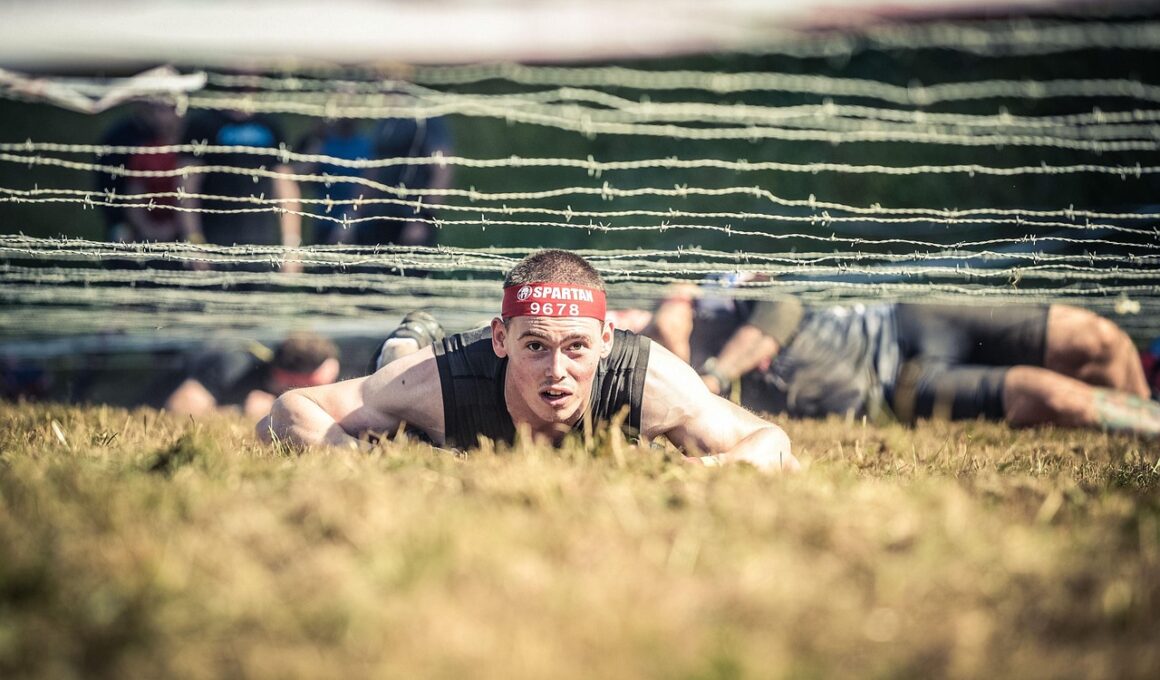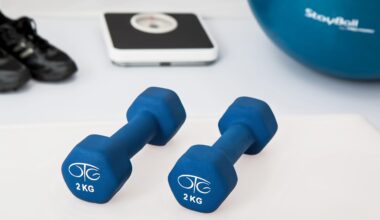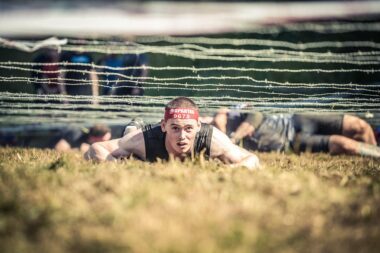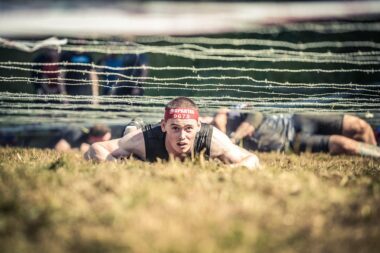Building Resilience: Staying Strong Through OCR Challenges
Obstacle Course Racing (OCR) is not just a physical test; it’s a mental one too. For athletes, building resilience is crucial in overcoming diverse challenges faced throughout training and competitions. The ability to bounce back from setbacks is vital, and it requires both mental fortitude and a strong support system. Establishing a positive mindset helps athletes view obstacles as opportunities for growth. This approach encourages navigating through obstacles instead of avoiding or fearing them. Each challenge faced during training can bolster an athlete’s self-belief and capability. Moreover, visualization techniques have proven effective in mental preparation. Athletes can picture themselves successfully conquering various challenges on the course. It enhances focus and commitment, reinforcing the belief in one’s abilities. Setting achievable yet challenging goals can also cultivate resilience. As athletes reach these milestones, their confidence grows, enhancing their mental toughness in the long run. Surrounding oneself with a supportive community of fellow OCR enthusiasts can further strengthen motivation. Sharing experiences, advice, and encouragement fosters an environment conducive to overcoming obstacles, ultimately leading to greater resilience and achievements.
Importance of Goals in OCR
Setting specific goals acts as an anchor for OCR athletes navigating their journey. Clear objectives create a sense of purpose that fuels the motivation to train consistently. Short and mid-term goals offer achievable benchmarks that can be celebrated along the way. Achieving these smaller goals build the necessary momentum, boosting confidence for larger upcoming challenges. For athletes, achieving a targeted distance, increasing speed or improving agility becomes a motivating factor that enhances focus. Moreover, it prepares them to face tougher obstacles with determination. Utilizing the SMART criteria can make goal setting more effective. Goals should be Specific, Measurable, Achievable, Relevant, and Time-bound. This structured approach not only brings clarity but also provides accountability, which is crucial in the OCR context. Athletes can track their progress systematically, allowing adjustments where necessary. Accountability partners within training groups can help maintain this focus. By regularly assessing their progress, athletes can reflect on their journey, identifying areas for improvement. Ultimately, having clearly defined goals can serve as a motivating factor, helping to cultivate a resilient mindset in the face of OCR challenges.
In the world of OCR, adversity is practically a given. However, athletes equipped with the right mindset can turn these setbacks into sources of inspiration. Understanding that stumbling blocks are just stepping stones is vital for maintaining resilience. During training, injuries, fatigue, or even disappointing results can occur, testing one’s commitment. Facing these adversities becomes an opportunity rather than a barrier. This perspective allows athletes to cultivate grit and perseverance, essential traits for success in OCR. Engaging in self-reflection can help athletes identify lessons learned from these experiences. Whether it’s analyzing a failure on a specific obstacle or reconsidering training methodologies, these insights provide valuable guidance. Moreover, cultivating a growth mindset enables athletes to embrace challenges as part of their development. By viewing effort and persistence as paths to mastery, resilience strengthens. Over time, athletes can develop coping strategies for when things don’t go as planned. These strategies include taking breaks, seeking mentorship, or engaging in mindfulness practices. With a resilient mindset, athletes become more adaptable in overcoming future hurdles.
The Role of Support Systems
Surrounding oneself with a strong support system can significantly contribute to resilience in OCR. This network may include family, friends, training partners, or mental coaches who provide encouragement during tough times. Social support serves as a buffer against stress and can fortify an athlete’s motivation. Additionally, sharing experiences within a community fosters a culture of collective resilience. When athletes witness others overcoming obstacles, it reignites their passion and determination. Participating in group training sessions or local OCR events builds camaraderie and accountability. This engagement not only enhances performance but also enriches the overall experience by sharing struggles and triumphs. Encouraging each other fosters a sense of belonging that can make a substantial difference. Moreover, discussing feelings and challenges offers relief to athletes navigating the pressures of competition. Mentorship can also play a key role; seasoned athletes can guide newcomers and share invaluable tips for overcoming challenges. Sometimes, simply having someone to listen can lift an athlete’s spirits. Strong support systems motivate OCR athletes to push through their limits and come out even stronger.
Incorporating regular recovery practices is essential for resilience in OCR. Training for obstacle races often places significant stress on the body and mind, requiring proper recovery strategies. Sleep, nutrition, and hydration impact an athlete’s ability to bounce back after tough workouts. Creating a consistent recovery routine is as imperative as the training itself. Techniques such as stretching, foam rolling, and rest days are crucial for muscle recovery and injury prevention. Athletes should prioritize sleep, aiming for at least seven to eight hours per night. Additionally, mindful nutrition choices promote physical recovery and energy replenishment. Consuming a balanced diet rich in lean proteins, complex carbohydrates, and healthy fats enables athletes to fuel their bodies. Implementing mental recovery practices, such as meditation or yoga, can also foster a stronger connection between body and mind. These methods help clear the mind, reduce stress, and promote mental resilience. Athletes should embrace rest days and listen to their bodies. Ultimately, adequately addressing recovery allows OCR athletes to maintain motivation and approach their goals with renewed strength and focus.
Mindfulness and Mental Strength
Practicing mindfulness can greatly enhance mental resilience for OCR athletes. Mindfulness involves being present in the moment, allowing athletes to break free from negative thought patterns or anxieties. This cognitive approach fosters self-awareness and helps manage stress during competitions or intense training sessions. Engaging in mindfulness exercises, such as meditation or breathing techniques, can cultivate calmness and clarity. Athletes can incorporate short mindfulness sessions into their daily routine, enhancing focus and minimizing distractions. Additionally, visualization techniques allow athletes to mentally rehearse successful runs through the obstacles on the course, reinforcing confidence. By focusing on positive outcomes, athletes can enhance their mental preparedness. Creating a mental cue, such as a mantra, can remind athletes to stay present and centered when faced with challenges. Regularly practicing mindfulness not only improves performance but also contributes to an athlete’s overall well-being. Furthermore, it empowers athletes to develop a positive shift in thinking. With mental clarity and strength, athletes can approach OCR races with enthusiasm. Consequently, the combination of physical training and mindfulness cultivates resilience, leading to consistent improvement and success.
Ultimately, resilience is essential for OCR athletes striving for success. Through goal-setting, personal reflection, support from others, effective recovery practices, and mindfulness, they can overcome any obstacle in their path. Each experience contributes to their growth, reinforcing their mental and emotional strength. Athletes learn to adapt to challenges, utilizing setbacks as stepping stones toward success. Furthermore, fostering resilience prepares them for competitions that can be unpredictable and fierce. Having a resilient mindset enables athletes to embrace discomfort, face fears head-on, and remain committed to their goals. It creates a culture of self-belief and determination, which is paramount in overcoming the physical and mental tests OCR provides. By combining physical training with mental resilience strategies, OCR athletes develop a comprehensive approach to their journey. In pursuing their passion, these athletes ultimately inspire others to engage in the world of OCR, showcasing the profound impact of resilience. This journey solidifies their identity as athletes who don’t just race through obstacles but thrive amidst challenges, exemplifying the very essence of what it means to be an OCR competitor.





